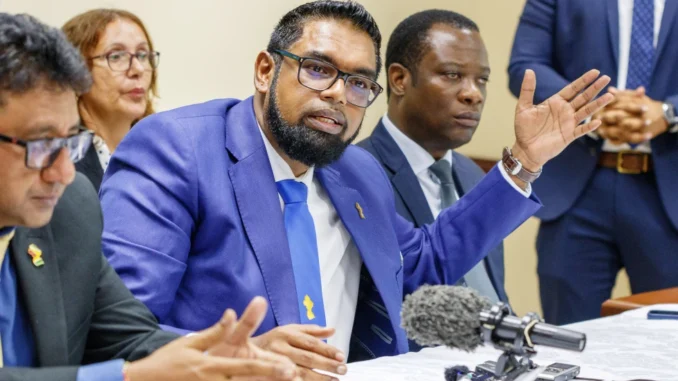
Guyana Denounces Venezuelan Military Provocation, Vows Firm Response Amid Escalating Oil Dispute
Guyana Denounces Venezuelan Military Provocation Vows Firm….The long-standing territorial dispute between Guyana and Venezuela has taken a dangerous turn as Guyana strongly denounces what it calls a deliberate act of military provocation by its western neighbor. The government of Guyana has condemned the recent Venezuelan military patrols in the disputed Essequibo region, calling them an aggressive and unlawful escalation in an already tense situation.
Escalating Tensions Over Oil-Rich Essequibo
At the heart of the conflict is the Essequibo region, a vast area covering nearly two-thirds of Guyana’s landmass. The dispute dates back more than a century, with Venezuela laying claim to the region despite an internationally recognized 1899 arbitral award that granted the territory to then British Guiana. The matter has gained renewed intensity in recent years following the discovery of vast oil reserves off the coast of Guyana, making Essequibo a high-stakes geopolitical flashpoint.
The latest incident has once again placed the two nations on the brink of confrontation. Guyana’s government has called the Venezuelan patrols a blatant violation of international law and a direct challenge to its sovereignty. In a strongly worded statement, Guyana’s President Irfaan Ali asserted that his nation would not tolerate any breach of its territorial integrity and pledged to take all necessary diplomatic and defensive measures to safeguard its sovereignty.
Guyana’s Firm Stance Against Venezuelan Aggression
Guyana has wasted no time in rallying diplomatic support to counter what it views as an aggressive move by Venezuela. The government has reached out to regional allies, including the Caribbean Community (CARICOM), the Organization of American States (OAS), and the United Nations, urging swift international intervention to de-escalate tensions. The United States and other Western nations have also expressed concern over Venezuela’s military posturing, warning against actions that could destabilize the region.
Foreign Minister Hugh Todd has emphasized that Guyana remains committed to peaceful dialogue but will not be intimidated by Venezuela’s military maneuvers. “We are a peaceful nation, but let it be clear: we will not cower in the face of threats. Venezuela’s actions are reckless and undermine regional stability,” Todd stated.
In response to Venezuela’s aggression, Guyana has announced an increased security presence in border regions, strengthening its defense capabilities and remaining vigilant for any further incursions. The Guyanese Defense Force (GDF) has been placed on heightened alert, with military exercises being conducted to prepare for any potential confrontation.
Venezuela’s Justification and International Reactions
Venezuela, under the leadership of President Nicolás Maduro, continues to assert that Essequibo rightfully belongs to Venezuela and has justified its military actions as protective measures against what it claims is foreign exploitation of its rightful resources. The Venezuelan government has accused Guyana of acting in the interests of multinational oil companies, particularly ExxonMobil, which has been heavily involved in oil exploration in the region.
The international community has largely sided with Guyana, reaffirming the validity of the 1899 ruling and urging Venezuela to respect Guyana’s sovereignty. The United Nations has called for restraint from both sides and encouraged diplomatic negotiations to prevent the dispute from escalating into a military conflict.
The United States has also weighed in, with Secretary of State Antony Blinken reaffirming Washington’s support for Guyana’s territorial integrity. “Venezuela’s actions are deeply concerning and must be addressed through diplomatic means. The U.S. stands firmly with Guyana and supports its sovereign rights over the Essequibo region,” Blinken stated.
The Path Forward: Diplomacy or Conflict?
With tensions at a boiling point, the question remains whether the dispute will be resolved through diplomatic negotiations or if further military provocations will lead to a broader regional crisis. Guyana has signaled its willingness to continue engaging with the International Court of Justice (ICJ), which is currently reviewing the case and is expected to provide a legal ruling on the matter.
However, Venezuela has repeatedly dismissed the ICJ’s authority, insisting on bilateral negotiations that Guyana perceives as an attempt to bypass established legal frameworks. The Maduro administration has also hinted at holding a referendum in Venezuela to solidify public support for its claim to Essequibo, a move that many international observers view as a politically motivated effort to distract from domestic crises.
Conclusion: A Defining Moment for Regional Stability
As the situation unfolds, Guyana stands at a critical juncture in defending its territorial integrity and maintaining regional peace. With the support of international allies and a firm commitment to upholding the rule of law, Guyana is prepared to confront Venezuela’s aggression while advocating for a peaceful resolution to the dispute.
The coming weeks will be crucial in determining the next phase of this geopolitical standoff. Whether through diplomatic pressure, legal proceedings, or further military posturing, the Essequibo dispute remains a contentious issue that could reshape the political and economic landscape of the region. One thing is clear: Guyana is not backing down, and the world is watching closely.
Leave a Reply